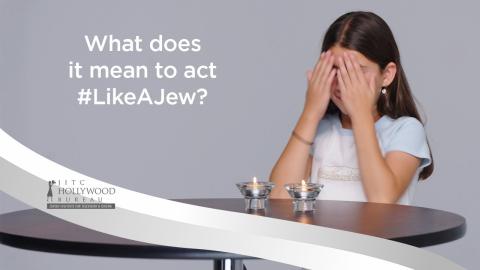‘Like a Jew’ Campaign: Hollywood Combats Antisemitic Stereotypes
The launch of the campaign comes at a time when antisemitism is rising worldwide, and the stories told by Hollywood carry enormous weight in shaping cultural perception.
Mayim Bialik, actress, author, and activist, shared the video with her audience along with producer Nancy Spielberg and Jews Don’t Count author and comedian David Baddiel, as actress Debra Messing re-posted it.
Bialik said: “This campaign deeply resonates with me as a Jew and as a storyteller. Too often, Jewish identity has been reduced to caricatures in mainstream media. Like A Jew reminds us—and teaches the next generation—that being Jewish is a source of strength, joy and purpose. It’s a message the world needs to see.
Nancy Spielberg, filmmaker, producer and advocate, praised the video: “Amazing!!! Amazing!!! Amazing!!! This is how we fight Jew hatred. This video shows viewers what really makes a Jew a Jew—it’s how we live our lives: making the world a better place. Treating each other with kindness, sensitivity, and fairness, as opposed to the tired tropes we’re used to seeing out of Hollywood. I only wish this could air on national television in primetime! Allison and I share the dire fear of what happens if we don’t create meaningful change in the world’s perception of Jews and our own perception of ourselves.”
Alongside the video, JITC issued an open letter to Hollywood, urging studios, writers, and executives to take responsibility for the real-world implications of Jewish representation.
“Hollywood was built in part by Jewish immigrants fleeing antisemitism,” wrote Josephs in the letter. “One hundred years later, you hold the tools to stem the tide of growing Jew hatred. As Jews make up only 2% of the U.S. population, many viewers may only encounter Jewish culture through your storylines.”
Open Letter:
Dear Hollywood,
The entertainment industry was founded, in large part, by Jews fleeing antisemitism. One hundred years later, you have the tools to stem the tide of growing Jew hatred in this moment. At the start of the television season, I’m urging you to reflect on the great influence your shows have on audiences around the world, not only on culture and entertainment, but also how your characters and stories have real-world implications.
You have taken this message to heart with meaningful narrative story change efforts for other marginalized groups. It’s now time to make those changes for Jewish characters too. As Jews make up only approximately 2% of the US population, the vast number of viewers may only experience our culture, history and traditions through your storylines, and you have the power to determine what — and who — they see.
Of course, you’ve given us excellent examples of authentic Jewish representation, that share our rich history and dynamic culture and we created the Jewish Media Awards to celebrate these moments, an act of hakarat hatov, the ancient Jewish value of showing appreciation.
But there’s still so much work to be done to make these moments the rule, not the exception. While we’re overjoyed our hostages are home and the end of the war in Gaza, violent antisemitic hate crimes against Jews are skyrocketing across the U.S., the U.K. and across the world. For Jews, accurate representation is an urgent issue.
When TV and film storylines and characters rely on tropes and hackneyed stereotypes about Jews, Jews in the real world become dehumanized. This puts real people at a very real risk of physical harm. (Earlier today, we also posted a video “Like A Jew” – hyperlink], a play on the famous Always “Like a Girl” campaign,” which juxtaposed some behaviors unfairly associated with Jews that are often seen on television, with examples of how proud Jewish children see themselves, when they are imbued with Jewish values of kindness, compassion, and good deeds (mitzvot).
We founded the Jewish Institute for Television & Cinema to train executives and creatives on ways to avoid the tired tropes and look for new ways to tell stories about Jews,and provide professional consulting services on Jewish storylines and characters. We’re grateful to the studio and production partners who have collaborated with us already and look forward to the opportunity to partner with more creatives and companies across the industry to broaden the world’s understanding of what it means to be a Jew. We know that many people get into this business to cultivate the kind of human connection that can only happen through great storytelling, and hope you will meet this moment to help us rehumanize Jews in the wider culture. So at the start of this season, please continue to weigh the immense power you wield and the real-world implications your choices have on the lives of Jews and other vulnerable minority communities.
Allison Josephs

